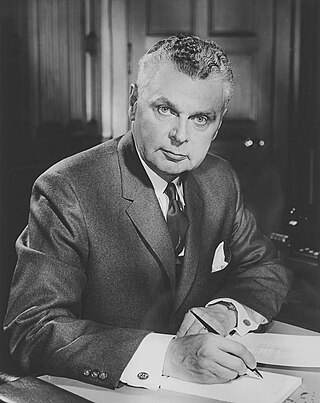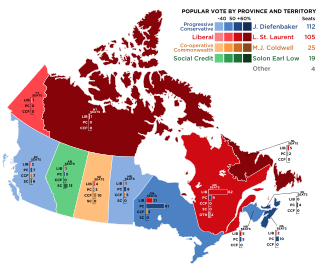Related Research Articles

John George Diefenbaker was the 13th prime minister of Canada, serving from 1957 to 1963. He was the only Progressive Conservative party leader between 1930 and 1979 to lead the party to an election victory, doing so three times, although only once with a majority of the seats in the House of Commons.

Louis Stephen St. Laurent was a Canadian lawyer and politician who served as the 12th prime minister of Canada from 1948 to 1957.

Robert Lorne Stanfield was a Canadian politician who served as the 17th premier of Nova Scotia from 1956 to 1967 and the leader of the Official Opposition and leader of the federal Progressive Conservative Party of Canada from 1967 to 1976.
Cyril Knowlton Nash was a Canadian journalist, author and news anchor. He was senior anchor of CBC Television's flagship news program, The National from 1978 until his retirement in 1988. He began his career in journalism by selling newspapers on the streets of Toronto during World War II. Before age 20, he was a professional journalist for British United Press. After some time as a freelance foreign correspondent, he became the CBC's Washington correspondent during the Kennedy and Johnson administrations, also covering stories in South and Central America and Vietnam. He moved back to Toronto in 1968 to join management as head of CBC's news and information programming, then stepped back in front of the camera in 1978 as anchor of CBC's late evening news program, The National. He stepped down from that position in 1988 to make way for Peter Mansbridge. Nash wrote several books about Canadian journalism and television, including his own memoirs as a foreign correspondent.

George Harris Hees was a Canadian politician and businessman.

The 1957 Canadian federal election was held June 10, 1957, to select the 265 members of the House of Commons of Canada of the 23rd Parliament of Canada. In one of the greatest upsets in Canadian political history, the Progressive Conservative Party, led by John Diefenbaker, brought an end to 22 years of Liberal rule, as the Tories were able to form a minority government despite losing the popular vote to the Liberals.

Howard Charles Green, was a Canadian federal politician.
Joseph Pierre Albert Sévigny, PC, OC, CD, VM, ED was a Canadian soldier, author, politician, and academic. He is best known for his involvement in the Munsinger Affair.

Julia Verlyn LaMarsh was a Canadian politician, lawyer, author and broadcaster. In 1963, she was only the second woman to ever serve as a federal Cabinet minister. Under Prime Minister Lester Pearson's minority governments of the middle and late 1960s, she helped push through the legislation that created the Canada Pension Plan and Medicare. As Secretary of State, she was in charge of Canada's Centennial celebrations in 1967. After leaving politics in 1968, she wrote three books, and had her own radio show on CBC Radio. She was stricken with pancreatic cancer in 1979 and was given the Order of Canada at her hospital bed. She died a few days short of the 20th anniversary of her first political election victory, in 1980.

The Great Canadian flag debate was a national debate that took place in 1963 and 1964 when a new design for the national flag of Canada was chosen.
Arthur Lewis Peter Stursberg, known as Peter Stursberg, was a Canadian writer and broadcaster.

Charles Burchill Lynch, was a Canadian journalist and author.

Lester Bowles "Mike" Pearson was a Canadian politician, diplomat, statesman, and scholar who served as the 14th prime minister of Canada from 1963 to 1968.
Munroe Scott was a Canadian freelance writer based in Lindsay, Ontario.
There have been numerous depictions of prime ministers of Canada in popular culture.
One Canadian: The Political Memoirs of the Rt. Hon. John G. Diefenbaker was a Canadian biographical television miniseries which aired on CBC Television from 1976 to 1977.
First Person Singular: Pearson – The Memoirs of a Prime Minister was a Canadian biographical television miniseries that aired on CBC Television from 1973 to 1975.
The Days Before Yesterday was a Canadian historical documentary television miniseries which aired on CBC Television in 1973.

This article is the Electoral history of John Diefenbaker, the thirteenth Prime Minister of Canada.
References
- ↑ Corcelli, John (September 2005). "The Tenth Decade". Canadian Communications Foundation. Retrieved 18 February 2013.
- ↑ "The Tenth Decade". Canadian Broadcasting Corporation . Retrieved 18 February 2013.
- ↑ "TV Times". Montreal Gazette . 30 October 1971. p. TV3. Retrieved 18 February 2013.